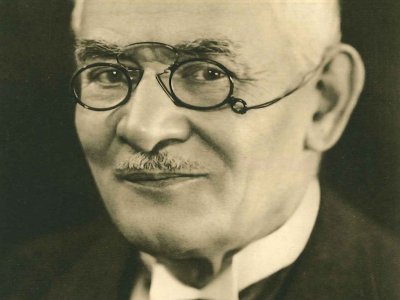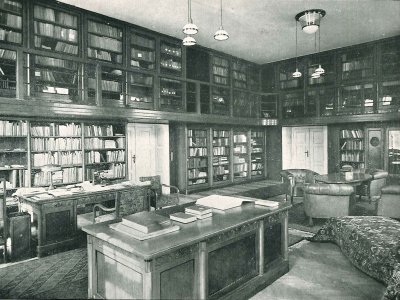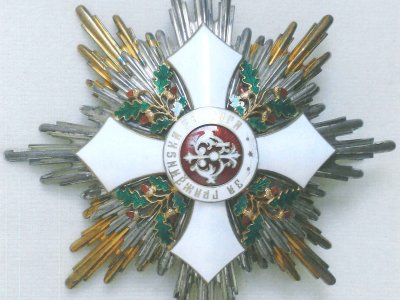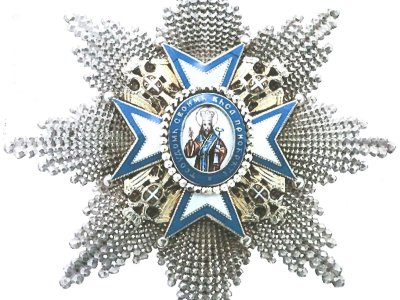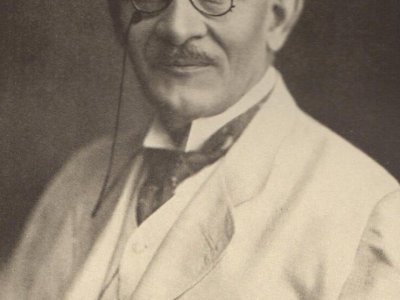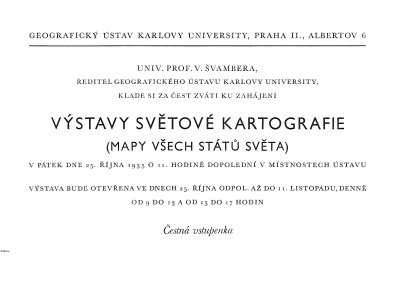Prof. PhDr. Václav Švambera
Leading Czech geographer Václav Švambera was born January 10th, 1866 in the town of Peruc (Louny District). He graduated from preparatory high school in Prague and then studied the fields of geography, history and geology at the Faculty of Philosophy of the Czech Charles-Ferdinand University. Václav Švambera became the favorite student of Jan Palacký (1830-1908) and during his studies acted as a voluntary librarian and archiver of the geographic institute there. In 1894 he became an assistant and two years later was promoted based on his dissertation work on the Libyan desert. In 1902 he qualified as a private associate professor of geography thanks to one of his most well known works on the Congo. He was appointed extraordinary professor in 1908 and entrusted with leading the geographic institute. He became a full professor during the war in 1916.
Václav Švambera was responsible for the construction of the building for the natural sciences on Albertov in Prague. It was his idea to move and expand the Map Collection and Geographic Institute here, which happened in 1913 before the faculty building was fully completed in 1926, and even before the Faculty of Science itself was established. This happened in 1920 with the separation of the natural science and mathematical departments from the Faculty of Philosophy. At the same time, based on Professor Švambera’s proposal the Ministry of Culture provided funding for the State Map Collection of the Czechoslovak Republic. In the 1923–24 academic year he became Dean of the Faculty. He went into retirement in 1936 and died three years later on September 27th in Prague. His exceptional relationship to the Map Collection was fully expressed by his final wish, which was to be buried with his wife in the Map Collection Hall.
Václav Švambera possessed broad geographical knowledge. He was most well known for his works in the field of hydrology. His extensive habilitation work Kongo compiled from 1901–1905 was at the time the largest monograph dedicated to rivers in the southern hemisphere. Among his important works was a treatise on the Šumava lakes, while other favorite topics in his extensive bibliography include the geography of the polar regions, Africa and other colonial lands.
From 1893-1898 he worked on Otto’s Encyclopedia and authored the majority of geographical entries up to the letter K. Together with Jan Palacký he funded and founded Travaux Géographiques Tchèques, which published important works of Czech geographers in foreign languages to help them become better known in the broader European professional community. He was also the primary author of the Czech Geographic Bibliography from 1905 to 1910. Finally, we should mention the outstanding series of old maps of the Czech lands Monumenta carthographica Bohemiae, published from 1932-1937, and collectively in 1938.
With his scientific and organizational activities, he endeavored to raise Czech geography to world standards. His first contact with colleagues abroad occurred in 1897, when he undertook a several-month study trip through Northern and Western Europe. He primarily studied in Berlin, under Professor Richthofen, and in Leipzig. He attended international geographic congresses and worked in foreign geography institutes. He took part in organizing the first Congress of Slavic Geographers and Ethnographers in 1924 in Prague. The tradition of these congresses carried on right up to the Second World War.
Václav Švambera was a board member for numerous international congresses, including ones in Berlin, Rome, Geneva, Cambridge, Paris and Warsaw. His exceptional service in the field of geography earned him numerous domestic and foreign awards, namely the Royal Yugoslavian Order of St. Sava second class, an officer of the Order of the Legion of Honor (Officier de la Légion d'honneur), Officer of the Order of Academic Palms (Officier de l'Instruction publique), the Medal of Cvijič and the Bulgarian Order of Civil Merit first class. Similarly, he was a member of renowned foreign and domestic geographic institutions, e.g. honorary member of the Royal Geographical Society in London, honorary member of the Polish Geographical Society in Warsaw, associate member of the Royal Czech Learned Society, and member of the Serbian Geographical Society in Belgrade.
Perhaps the greatest contribution of Professor Švambera’s work was the initiation and creation of the Geographic Institute in Prague, which met world standards and not only educated the next generation of geographers, but also produced original Czech scientific work which it presented at international forums. Professor Švambera was known for his boundless enthusiasm, love and dedication to the field, and he viewed the creation of the Geographic Institute as the fulfillment of his life’s goal. The Faculty building on Albertov, Geographic Department, Map Collection and Library of Geography which he founded and built are all still here one hundred years later.
On the occasion of the 150th anniversary of his birth, the event "Čteme profesora Švamberu" took place.
Digitized full texts
VAMBERA, Václav. Geografický ústav české university. Praha: V. Švambera, 1907. Available online here.
ŠVAMBERA, Václav, Antonín BASL a Česká společnost zeměvědná. Bibliografie české literatury geografické. Praha: Geografický ústav České university, 1912. Available online here.
Literature
HŮRSKÝ, Josef. Vzpomínka na Václava Švamberu: k 50. výročí úmrtí. Sborník Československé geografické společnosti. 1989, roč. 94, č. 3, s. 181-184. ISSN 1210-115X
NIKOLAU, Stanislav. Za prof. drem Václavem Švamberou. Sborník České společnosti zeměpisné. 1939, roč. 45, č. 1, s. 81-87. ISSN 0036-5254
Václav Švambera. Wikipedie: Otevřená encyklopedie [online]. Poslední změna 25. 10. 2014, 11:55. Dostupné z: http://cs.wikipedia.org/wiki/V%C3%A1clav_%C5%A0vambera






















